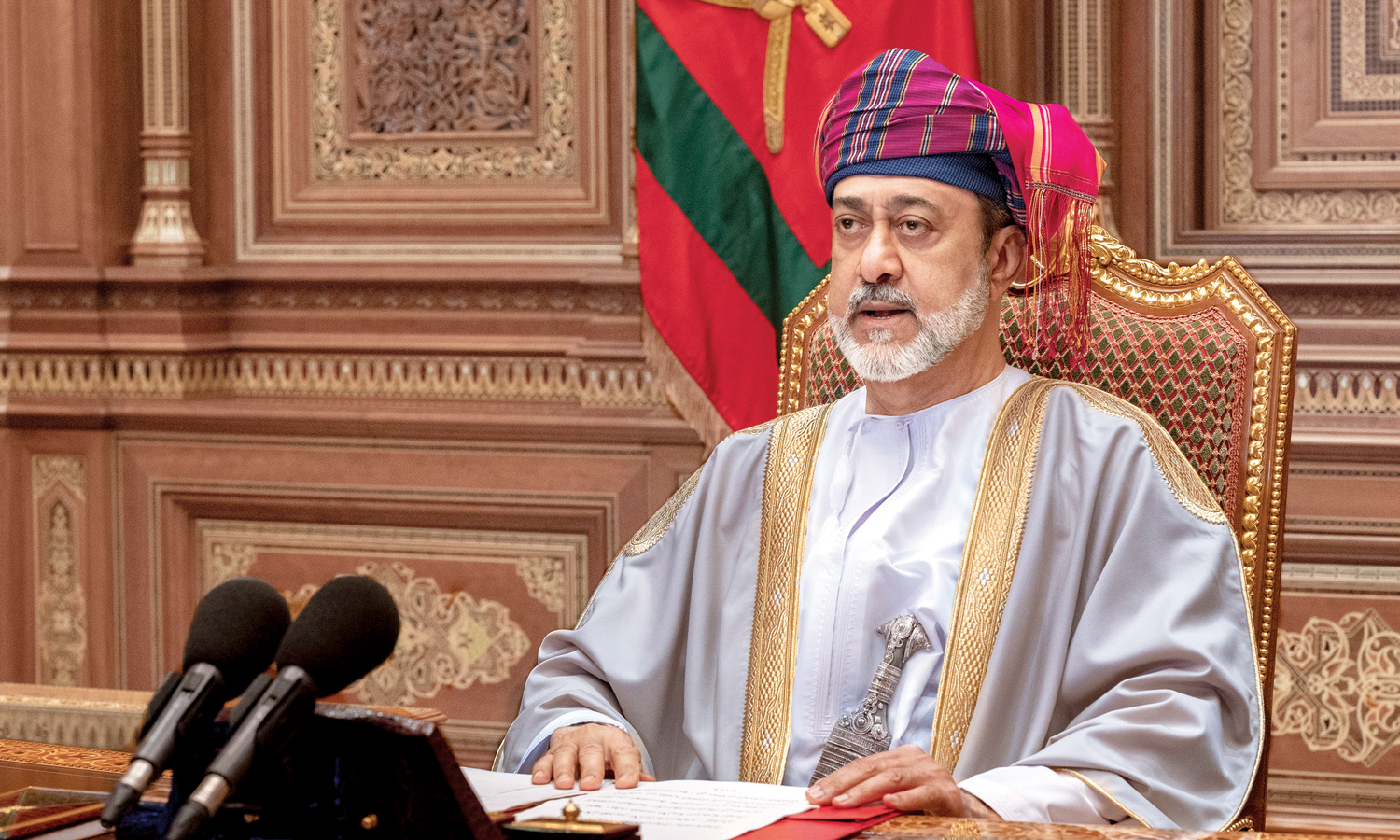

MUSCAT: The Basic Law of the State (also referred to as the Basic Statute of the State), promulgated by Royal Decree No 6/2021, states in Article (1) that the Sultanate of Oman is a fully-sovereign, independent Arab state and Muscat is its capital. Some of the articles of the Basic Law are as follows.
Article (2) states that Islamic religion and Islamic legislation are the basis of legislation.
Article (3) states that Arabic language is the official language of the state.
Article (4) says that the flag, emblems, orders and national anthem of the state should be determined by the Law.
Article (5) stipulates that the system of governance is hereditary in the male descendants of Sultan Turki bin Said bin Sultan in accordance with the following provisions:
The power passes from the Sultan to his first-born son and then to his eldest son and consequently the power transfers to one stratum after another. In case the Sultan’s elder son dies before assuming power, the succession should be transferred to his elder son even if the deceased has brothers.
The Law also stipulates that in case that the first person in line of succession has no sons, the rule automatically shifts to his elder brother, and if he has no brothers the succession shifts to the eldest son of his eldest brother, and if his eldest brother has no son the succession transfers to the eldest son of his other brothers according to the age order of the brothers.
The Law stipulates that in case that the heir to the throne has no sons or brothers, the succession should be transferred to his uncles and their sons according to the aforementioned age order.
The successor of the Sultan should be Muslim, sane and a legitimate son of Omani Muslim parents.
Additionally, the Basic Law of the State stipulates that in case that succession moves to a person who is under 21 years of age, the power of the Sultan should be exercised by a Guardian Council appointed by the Sultan. In case that a Guardian Council has not been appointed, the Royal Family Council should appoint a Guardian Council comprising one of the Sultan’s brothers and two of his cousins.
As per Article (5), a Royal order appointing the crown prince and specifying his duties, specialisations and prerogatives, will be issued. Following his appointment and prior to undertaking his responsibilities, the crown prince should take oath before the Sultan as stipulated by Article (10) of the Basic Law of the State.
In case that a temporary hindrance occurred that prevented the Sultan from performing his duties, the crown prince should take over power.
Article (11) of states that the Sultan, before performing his specialisations, takes the legal oath before the members of the Council of Oman the Royal Family Council, the Council of Ministers, the Supreme Judicial Council.
The Law stipulates that the Royal Family should have a Royal Family Council, the formulation, specialisations and member priority of which should be determined by a Royal Decree.
Article (11) of the Basic Law of the State states that the government should continue to act as usual until the Sultan is appointed and takes on his purviews.
Article (12) says that the rule of state is based on the principles of justice, equality, consultation and that the citizens have the right to participate in the public affairs in accordance with the Basic Law of the State and the conditions stipulated by the laws.
COMMITTEE
The Basic Law of the State stipulates in Article (65) that a committee under the Sultan should be formed and entrusted with following up and evaluating the performance of the ministers, under-secretaries and officials in the same category as well as chairmen and members of boards of directors and executive chairmen and CEOs of the public establishments and other units of the state’s administrative apparatus. A Royal order will be issued determining the formulation, working system and specialisations of the said committee.
Article (66) of the Basic Law of the State states that an authority under the name sate audit financial and administrative authority should be formulated under the Sultan. The Authority specialises with the financial and administrative monitoring of the units of the state’s administrative apparatus and other public entities in accordance with the law. The Authority should send a copy of its annual report to the Council of Ministers, the State Council and Majlis Ash’shura.
POLITICAL PRINCIPLES
The state’s political principles stated by the Basic Law of the State stipulates the maintenance of the state’s independence and sovereignty, preserving its stability as well as protecting the state, establishing a perfect administrative system that guarantees justice and equality between citizens.
Article (12) of the Basic Law of the State prohibits the exile and expelling of citizens or preventing them from returning to the country.
With regard to the economic principles, the Basic Law of the State stipulates the state guarantees freedom of economic activities on the bases of social justice, cooperation, and
balance between the public and the private sector with the aim of achieving economic and social development and boosting productivity.
The Basic Law of the State stipulates that education is a right for every citizen and that the aim of education is to build the Omani personality, preserve the national identity, enhance the scientific approach in thinking and developing skill and encouraging innovation. The state guarantees freedom of scientific research, supports scientific institutions and nurtures researchers and scientists.
Oman Observer is now on the WhatsApp channel. Click here



